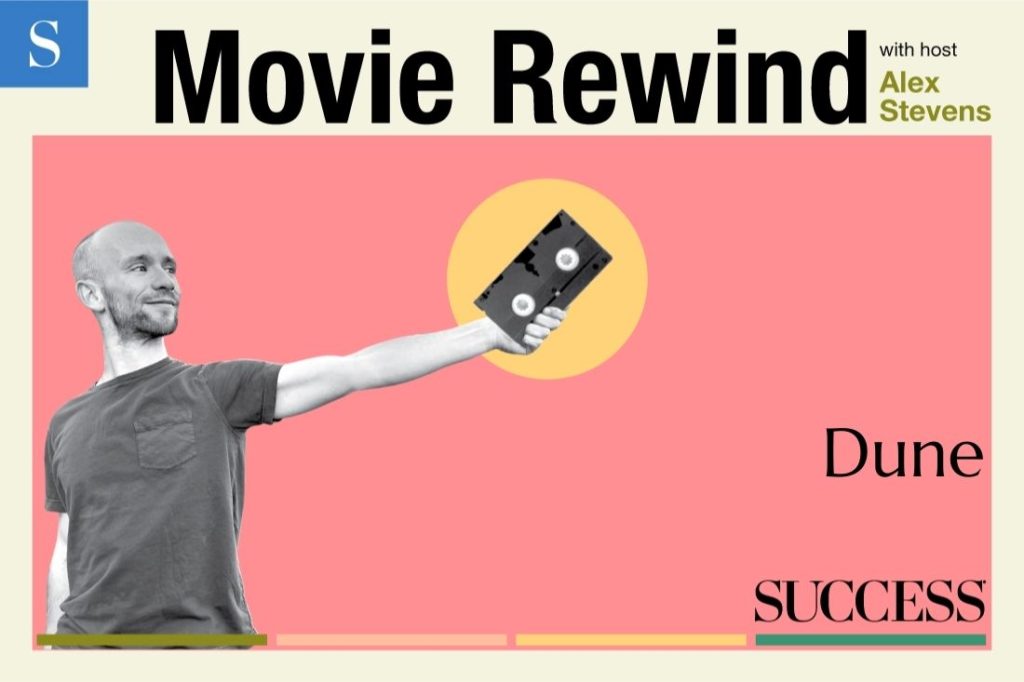I’ve been looking forward to this episode almost as much as I was looking forward to seeing the actual movie last year. This is it—the big Dune discussion. This is a great story for everybody. It takes itself seriously, but it takes the audience seriously, too. And it was certainly one of the best movies of 2021.
I can’t recommend this one enough, but even if you haven’t seen it yet, put on your space helmet, sit tight and listen. We’re about to pick this mythic, epic, excellent film apart to find the nuggets of wisdom most pertinent to the entrepreneurs, self-improvers and all-around goal crushers among us.
This is SUCCESS Movie Rewind, after all—it’s what we do. Let’s dive in.
Lesson 1: “Dreams are messages from the deep.”
Our first takeaway comes from the very first scene of the film. It’s a strange sound (listen to the podcast to hear it) accompanied by words that appear on the screen: “Dreams are messages from the deep.”
This little quote gets almost no direct explanation in the movie, but we later hear the fabulously named Duncan Idaho (Jason Momoa) issue a retort: “Dreams make good stories. But everything important happens when we’re awake.”
I love that. The two messages come together perfectly to speak to anyone who has a vision for how their life, their career or the world should be. Your dreams are important messages from your true self, and sometimes they inform you and push you forward in ways your conscious mind alone might never have.
But when you’re awake, that’s when you make things happen. Marry the two, and you’ve got messages from the deep informing your conscious processes. That’s a goal-achieving formula if I’ve ever heard one.
It’s not hard to see how this plays out in the non-movie world. If you look around at anything—a swingset in a backyard, a skyscraper, a past achievement, your home—you see evidence of someone having gone deep to achieve a vision. But there were physical materials and physical labors involved in getting there.
Lesson 2: Trust the process, but remember you’re a part of it.
In both the novel and the new movie, a character named Reverend Mother Gaius Helen Mohiam utters the words that inspire our second personal development takeaway: “The mystery of life isn’t a problem to solve, but a reality to experience.”
If you’re a doer—an entrepreneur, a self-improvement fanatic, a success-driven individual—you are likely in the habit of solving problems on a daily or even hourly basis. It’s how you propel yourself forward, after all. But I want to start the first half of this takeaway with a common saying that relates to the above quote from the film: Trust the process.
You do have to trust the process sometimes. That might be at a point in your career when you’re in an apprenticeship-like role. It might be when you’re building your first business and fumbling through steps one through 10. In any case, you do need to take moments to sit back and trust the process established by those who have gone before you.
But I want to make a small addendum to that. Trust the process, but remember that you’re a part of the process. The reality to experience is your reality. It’s the balance between action and inaction. You can and should trust the process, but because you are a part of the process, you need to make sure you’re taking action when it’s truly called for. Trust the process too much, and you won’t achieve a groundbreaking dream or change the world.
Lesson 3: We are all the Kwisatz Haderach.
I probably should have Googled how to pronounce this one, but since you’re reading this right now, I’ll leave the pronunciation up to your mental voice. Here’s our third takeaway from Dune: We are all the Kwisatz Haderach.
No, I don’t need a tissue. That’s the word used by a coven of witchy space nuns (if you don’t know what I’m talking about, now you have to see the movie!) to refer to a being they have been trying to influence into existence for thousands of years. This being can bridge time and space with their mind alone. Pretty cool stuff, and you are one of them.
Me, too. All of us. You’re not in the same room as me right now; you weren’t in my garage when I recorded this podcast. But you’re connecting with me, or a version of me, and something I said in the past. I issued these thoughts in the past, and they’re connecting with you in the future. We all have the power to bridge time and space with our minds. We are all the Kwisatz Haderach.
What does that mean for your personal development goals? You have the ultimate tool right between your ears. You are more and are capable of more than you were given at birth—more than your family history might suggest, more than your bank account, more than your resume. You have the power to bridge time and space with your mind alone, and with that, what can’t you achieve?
‘The Batman’ is the next one
I could talk about Dune all day, and if you catch me on the right day, I will. But I won’t subject you to it here. Let’s call that one a wrap. If you haven’t seen Dune, you’re missing out, but you haven’t missed your chance. It’s 2022—you can probably start watching it literally right now.
When you’re done with Dune, you might as well grab tickets to The Batman because that’s the movie we’re going to talk about next week. See you there.



